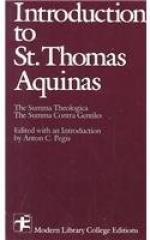
|
| Name: _________________________ | Period: ___________________ |
This test consists of 5 multiple choice questions, 5 short answer questions, and 10 short essay questions.
Multiple Choice Questions
1. According to Aquinas, Aristotle says that the soul is only separable from the body inasmuch as what?
(a) The separation of mind and body at death.
(b) God wants it to be.
(c) One believes it to be.
(d) Thoughts and practices are.
2. What does Aquinas mean by truth that is immutable?
(a) It can be changed.
(b) It must be changed in some circumstances.
(c) It changes often.
(d) It does not and cannot be changed.
3. God's power dwells throughout every one of what?
(a) Man's thoughts.
(b) Man's actions.
(c) God's actions.
(d) God's beings.
4. Who had a Christian best friend for many years?
(a) Moses.
(b) Plato.
(c) Mohammed.
(d) Buddha.
5. What is meant by an article?
(a) A short story or analogy.
(b) A brief essay and clarification.
(c) A lengthy definition of the topic.
(d) A lengthy discourse on the topic.
Short Answer Questions
1. When Aquinas turns to the debate format, what is he assuming about the reader?
2. Aquinas observes that while "the Philosopher" claims that the human intellect can have perfect knowledge, he uses Aristotle to refute this. He cites an observation made in De Anima to prove this. What does he say is in the mind's understanding of things?
3. Who translated the book?
4. When was Summa Theologica written?
5. What test does Aquinas' idea stand?
Short Essay Questions
1. What is said in response to the question of whether truth resides only in the intellect?
2. What is Aquinas' response about truth?
3. What is Aquinas' response to Question LXXV On Man who is Composed of a Spiritual and a Corporeal Substance: And First, Concerning What Belongs to the Essence of the Soul?
4. The sixth article takes up the matter of the puzzle of whether the human soul is corruptible or incorruptible. What does Aquinas say about this?
5. Who is Dionysius?
6. What does Aquinas say to the objections that the will of God must always be fulfilled?
7. What does Aquinas say about potentiality and actuality?
8. What is a Thomist?
9. What does Aquinas say about whether there is will in God?
10. How was Aquinas able to write this book successfully?
|
This section contains 902 words (approx. 4 pages at 300 words per page) |

|




